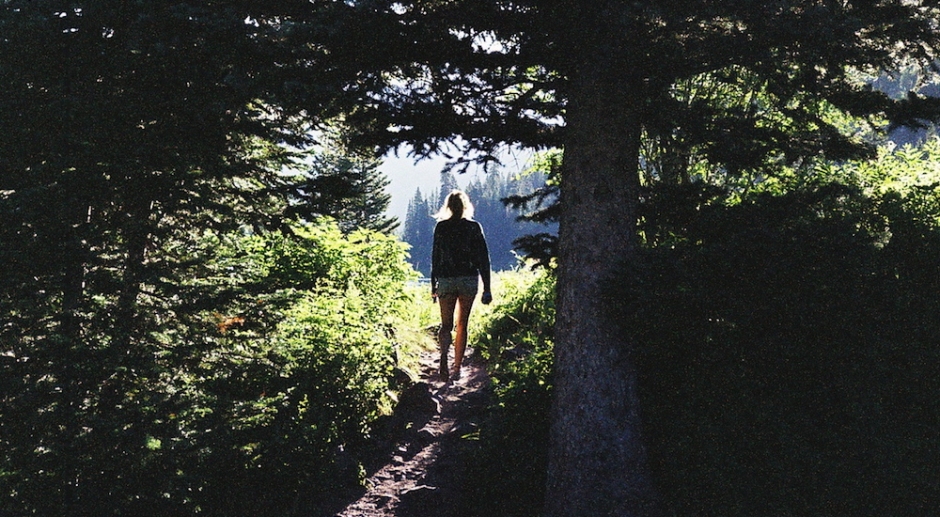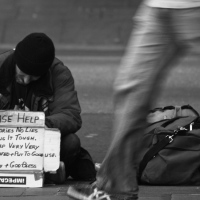 Abortion: Every Woman's RightA longitudinal study in the US shows an overwhelming majority of women do not regret having an abortion.
Abortion: Every Woman's RightA longitudinal study in the US shows an overwhelming majority of women do not regret having an abortion.

Our Environmental Disconnection
The treasures of the natural world are more important than ever before.
A few weeks ago, Will Bentley-Hawkins spoke about two of the more influential people on the planet discussing environment and climate change. Admittedly Obama failed to provide Attenborough with tea and scones, but it was still an engrossing interview. A particular snippet of their little chat really jumped out at me, and has been playing out in my head ever since. It went something like this:
Obama: "How did you get interested in nature, and wanting to report it? When you think back on this storied career, well what is it that led to such a deep fascination with how the natural world worked?"
To which Sir David responded, oh so eloquently: "Well I have never met a child who's not interested in natural history...kids love it. Kids understand the natural world and are fascinated by it. So the question is, how did you lose it? How did anyone lose the interest in nature?

Engaging with the incomprehensible beauty and mystique of the natural world is too good to lose. Nature transcends any words that any person can scrawl on a piece of paper, it transcends any music dedicated to its existence, it has always been there and we spend our lives trying to make sense of certain natural phenomena that, in many cases, are beyond our capabilities to understand. Undoubtedly, the best way to engage with our natural surroundings is through personal experience - most probably in solitude. For many of us these experiences are rare, but it is at these times when your awareness of the intricacy and infiniteness of the natural world is heightened.
For me personally, there is no greater feeling than that inspired by the natural environment - climbing a mountain, swimming in pristine waterholes, or standing tall inside a vortex of water (known to some as surfing). These experiences, when an awareness of space and time seem to disappear, have brought me immeasurable joy over my short lifetime. I've had those moments, often in isolated environments, where I've thought to myself, "Why the hell would I want to be anywhere else?" And then life happens. Various commitments, the need to support these splendid ventures by slaving away in front of a coffee machine, personal relationships to keep and maintain, the wonders of experiences of the musical sort, the thirst for knowledge from an infinite amount of sources.
I moved to Hobart in February of this year to study a course in Adventure Guiding (it's as good as it sounds). Over the course of the last five months I learned how to identify native flora and fauna and cool things about the way they function and flourish, I was exposed to the intricate and special way in which the Tasmanian Aboriginal community communicates with the land around them, and best of all, spent heaps of time in the outdoors exploring the spellbinding beauty of Tasmania in all its moods and landscapes.
I decided to move to Hobart because I felt disconnected from the natural world. In some ways, this feeling of disconnection wasn't entirely logical or even true. I convinced myself that because I lived in Sydney, I was unable to remain in tune with the natural world. My years spent living in the big city revolved around escaping it at any possible chance, to the south, to the west, to the north. Time at uni in lectures was spent daydreaming about the next getaway.

I persuaded myself that the city was inhibiting my ability to maintain a link with the environment. Somehow I was ignoring the fact that I frequented the beach daily, escaped to the wonders of the NSW South Coast (above, via) fortnightly, and lived in a suburb that provided me with a host of walks that were much more beautiful that I gave them credit for. I came to realise that maintaining a connection with the natural world was more based on a state of mind, on a conscious effort to remain aware of my surroundings.
According to a report by the Department of Infrastructure, 2008 was the first year in history when more than half of the world population resided in cities. Estimates now suggest that by 2030, 80% of the entire global population will live in urban areas. 80%! That's a loooottt of people. What's more, aside from some city-states such as Monaco and Singapore, Australia is now the most urbanised nation on the planet. We have this vast country to inhabit yet many of us cramp into tiny apartments in Sydney, Melbourne or Perth, myself included...why? What is so attractive about city living that forces us to disconnect from true natural environments?
Everyone probably has different answers to that question. Some of mine include delicious coffee and cafe breakfasts, opportunities to see a wide array of live music, to be immersed in a melting pot of varied cultures and, more generally, the fact that there's always stuff happening. Cities are where most rural students relocate to further their education, are undoubtedly the best place to seek employment, and are places where we are able to interact with, and learn from, people from all walks of life. So, I guess it's not too hard to understand why we all want to huddle together in small chunks of a very large continent.

What's important is that although we tend to congregate in cities, getting all cultured up, we can still keep the natural world at the forefront of our thinking. It is because of a severe lack of consideration for our natural world that a massive coal mine is on the cusp of being approved in the Liverpool Plains in North-West NSW, that the Great Barrier Reef is in severe danger of being lost if inaction continues [UPDATE: we did get a bit of good news RE: GBR this week, read HERE], or that the plight of the last pocket of true wilderness in Australia could be subject to logging and increased tourism development (above, via). We too often think that nature is only there for human benefit. It provides for us. Although it provides energy in the form of coal and oil and gas, far more important are fresh food, clean water and air to breathe. But more often than not we don't see it that way. We do a lot of taking, but we rarely seem to give back to the natural world in return for all the blessings nature constantly offers us.
In a recent video released by Conservation International (watch below), Mother Nature (or Julia Roberts, depending on how you look at it) reminds us, "I have fed species greater than you, and I have starved species greater than you." She reiterates the simple fact that she has existed for 22,500 times longer than us humans - a lifetime spanning approximately 4.5 billion years. Now that's a long time, and it’s something worth remembering before we continue providing catalysts for our own extinction. It's that state of mind that I was talking about earlier. Acknowledging (and addressing) our own self-interest, both individually and collectively as part of the human race, is something that must happen, and soon. A failure to do so will have disastrous ramifications for the human race. But, as Attenborough points out, you only have to give Mother Nature half a chance and she will provide all the hope we need for a promising future.
As well as providing a sense of hope, Sir David Attenborough issues what appears to be a warning. Following the discussion of kids' fascination and genuine interest with the natural world, he emphasises a very important point relating to our tendency to disconnect from the natural world around us. It goes something like this:
"If you do lose it, and I imagine there are lots of other attractions that can divert your attention, you've lost a very great treasure."
Try not to lose that treasure that David Attenborough talks about. It is that very treasure that keeps you alive. More simply, it is that treasure that can provide untold joy and happiness. Moments immersed in the natural world help to release stress and pain. We forget about money, we forget about work, we forget about bills and the rent or the mortgage. I'm still yet to find a better way to release stress than being immersed in saltwater, where all my anxieties and worries seem to stream away into insignificance just like the water off my back. It is times like these that remind us we're just an incredibly insignificant being, on a big blue planet, rocketing through some weird space vacuum.
Stay connected to the natural world, because really, it's all we've got.
Header photo via.
 Abortion: Every Woman's RightA longitudinal study in the US shows an overwhelming majority of women do not regret having an abortion.
Abortion: Every Woman's RightA longitudinal study in the US shows an overwhelming majority of women do not regret having an abortion.
 Homelessness In AustraliaOne interaction can go a long way.
Homelessness In AustraliaOne interaction can go a long way.